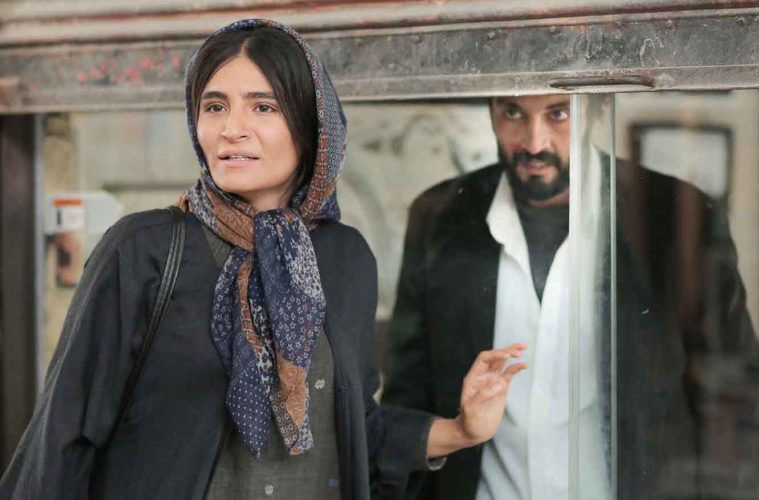 Asghar Farhadi’s A Hero, like all of the new Iranian filmmaker’s distinctively hyperrealist films, is an oratorio of social catastrophe. No other living filmmaker we know of comes close to the density of Farhadi’s narrative engineering or the white-hot chords of guilt-dread-shame-stress he routinely strikes. The writer/director does this, mostly, in the arena of Iranian society, where Sharia law, and traditions about honor and women, create impossible obstacle courses for the well-meaning and the luckless.
Asghar Farhadi’s A Hero, like all of the new Iranian filmmaker’s distinctively hyperrealist films, is an oratorio of social catastrophe. No other living filmmaker we know of comes close to the density of Farhadi’s narrative engineering or the white-hot chords of guilt-dread-shame-stress he routinely strikes. The writer/director does this, mostly, in the arena of Iranian society, where Sharia law, and traditions about honor and women, create impossible obstacle courses for the well-meaning and the luckless.
Anyone who’s parsed his breakout film, A Separation (2011), knows the landscape: cluttered naturalistic visuals, performances that bottle tension even during peak crises, plots that cascade like crumbling buildings once misfortune and lies knock over the first domino. A Hero begins, typically, in medias res, with a man, Rahim (Amir Jadidi), leaving prison and missing the bus home. We learn gradually about his situation, and Farhadi lays out the web of intricacies far more deftly than I can here. Rahim is out on a two-day leave from a sentence for unpaid debt, and he has a plan involving a lost handbag of gold coins that his girlfriend (Sahar Goldoust) found. He is divorced, which means his budding romance must be kept secret (or else compromise his girlfriend’s reputation), and his son, who has a tragic stuttering condition, lives with the family of his upstanding sister (Fereshteh Sadre Orafaiy). His debt, which triggered his divorce, was once owed to a loan shark; his ex-brother-in-law, Bahram (Mohsen Tanabandeh), had covered it with a bond and tried to recoup the cash for three years, before filing the complaint that landed Rahim in stir.
Jadidi’s Rahim is an earnest, puppy-dog-eyed smiler, so we initially believe he’s been treated unjustly, but in Farhadi’s world nobody is guiltless and everyone keeps secrets. We hardly have time to consider what Rahim was doing during those three years, because the plot-river never pauses. He starts out his leave by lying—telling his family that “a friend” has promised to give him, not loan him, half the debt sum, but with the clock ticking and after an initial attempt to sell the coins fails, Rahim is convinced to return them to whoever lost them, which under his circumstances looks to his kindly prison administrators, after he returns, to be the act of a hero.
So, everyone who knows him knows he was lying at first, and no one seems very surprised; in public, he suddenly has real reputational stock value. Finding the coins’ real owner turns out to be relatively easy, but once she comes and goes without leaving a trace, and Rahim becomes a local TV celebrity and obtains an extended leave, proving that she exists is not. Social media rumors start circulating, prospective employers demand proof, incriminating texts proliferate, all of which compels Rahim to keep lying, in larger and more hair-raising ways. (He also uses his pitiable son as a public prop more than once, a move Bahram, the creditor, can’t stomach.)
Recounted like this, Farhadi’s film sounds like a mere morality tale, but it’s more like an iron maiden of inevitabilities, a pig-pile of social damnation fueled by Rahim’s desperation and his belief that the rules can be bent harmlessly if only appearances are kept up. There’s elbow room for ambivalences, too; the movie invites us to lay down judgments, but we find we cannot, given the spread of perspectives and sympathies and desires. Eventually, Farhadi’s compounding scenarios begin to feel like bad dreams—every compromised decision and deception spawns new trouble, and you’re tempted to let your credulity feel the strain.
Yet the filmmaker’s stories are always meticulously convincing, and if it seems to us that Rahim might be fielding too much pervasive suspicion, maybe that’s part of Farhadi’s point: In Iran, his hero’s plight is a slight dystopic exaggeration of what the social rules already offer. (In America’s slippery social media melee of hyperbole, irony, and outright lies, Rahim might’ve gotten away with it.) Farhadi’s urgent compositional sense, which rarely strays far from the characters’ personal spaces, makes it all feel balls-of-your-feet. But the film also ends on a more contemplative note, with one of the great final shots of the past decade, in which the saga goes full circle and yet glimpses, outside Rahim’s bubble, a life without loss and lies.
Advertising disclosure: We may receive compensation for some of the links in our stories. Thank you for supporting LA Weekly and our advertisers.

